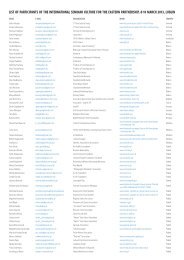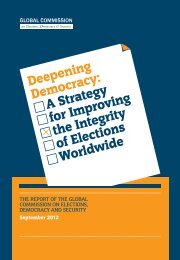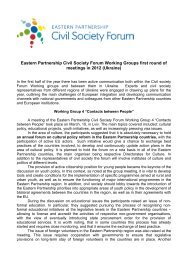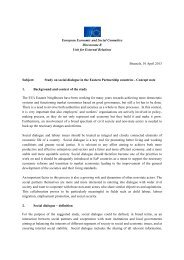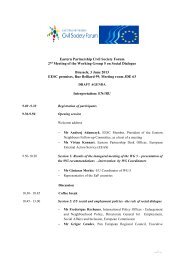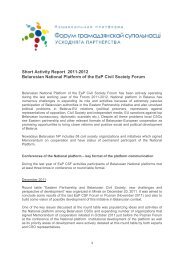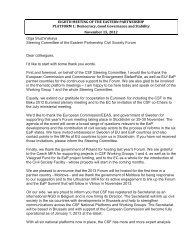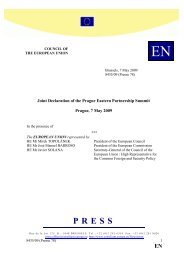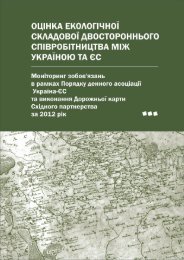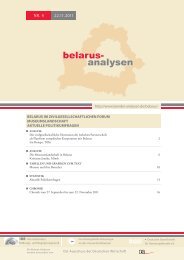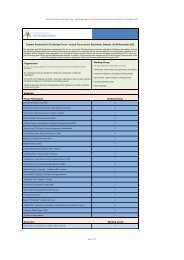Non-formal education - Eastern Partnership Civil Society Forum
Non-formal education - Eastern Partnership Civil Society Forum
Non-formal education - Eastern Partnership Civil Society Forum
Create successful ePaper yourself
Turn your PDF publications into a flip-book with our unique Google optimized e-Paper software.
Features of NFE<br />
1. Educational planning.<br />
Program is madeby students, based on the goals and objectives of the course. But it is the initial offer<br />
and can be changed, taking into account the desires, interests and expectations of the participants.<br />
2. Nature of participation<br />
Participation is based on the principle of voluntariness. Participants are free to decide what part of<br />
the process they want to participate.<br />
3. Character of received skills and knowledge<br />
During training, equal attention is paid to the mental, physical and sensory activities of the<br />
participants (called a comprehensive approach). The learning process is organized in accordance with<br />
the approaches, models of behavior, value system and participants’stereotypes.<br />
4. Formof knowledgereceiving / transmitting<br />
Knowledge and skills are acquired through direct participation in the learning process. Process<br />
is implemented by \ person fully equipped with the knowledge and skills coach. In contrast to the<br />
hierarchical ‘’from the top-down’’ model, in this case, knowledge is obtained by ‘’horizontal’’ (using peerto-peer)<br />
one.<br />
5. Evaluating the effectiveness of training<br />
Recognition is the evaluation of the knowledge and skills acquired through participation in non<strong>formal</strong><br />
<strong>education</strong> of the public and private sectors, non-governmental organizations.<br />
Self-esteem of the participants (what does the participant get as a result of learning process) and<br />
evaluating the effectiveness of the process (the quality of training and meet the expectations of the<br />
participant). The concepts of the exam, the test are not used. Mutual aid and team spirit are encouraged,<br />
while no encouragementis applied. At the end of the course all participants are provided with “certificates<br />
of participation.’’<br />
Subjects of NFE<br />
The subjects of non-<strong>formal</strong> <strong>education</strong> are:<br />
1. Public administration and local self-government of Armenia.<br />
2. Specialized public and private institutions of the <strong>education</strong>al system of Armenia.<br />
3. Specialized structures, offering non-<strong>formal</strong> <strong>education</strong>.<br />
4. <strong>Non</strong>-<strong>formal</strong> <strong>education</strong> specialists (coaches).<br />
5. NGOs and associations registered and operating in accordance with the Law of RA.<br />
6. RA citizens, foreign citizens, persons without citizenship, but are members of non-<strong>formal</strong><br />
<strong>education</strong>.<br />
7. The international organizations and other interested organization, registered and operating in<br />
accordance with the law of RA.<br />
Principles of state policy in the field of non-<strong>formal</strong> <strong>education</strong><br />
1. Participation of structures that provide non-<strong>formal</strong> <strong>education</strong> in the development of public policy<br />
and decision-making in the field of non-<strong>formal</strong> <strong>education</strong>.<br />
2. Provision, competition and availability of non-<strong>formal</strong> <strong>education</strong>.<br />
3. Acceptance of the principles of complementarity of <strong>formal</strong> and non-<strong>formal</strong> <strong>education</strong> systems<br />
(non-<strong>formal</strong> <strong>education</strong> system is not intended to replace the <strong>formal</strong> <strong>education</strong> system.)<br />
Main activities aimed at full integration of non-<strong>formal</strong> <strong>education</strong> into the general <strong>education</strong><br />
system of the country<br />
In the process of developing a program of action for 2008-2013,aimed at promoting non-<strong>formal</strong><br />
<strong>education</strong>, there have been a number of activities designed to raise public awareness to expand the<br />
availability and distribution of non-<strong>formal</strong> <strong>education</strong>.<br />
17



